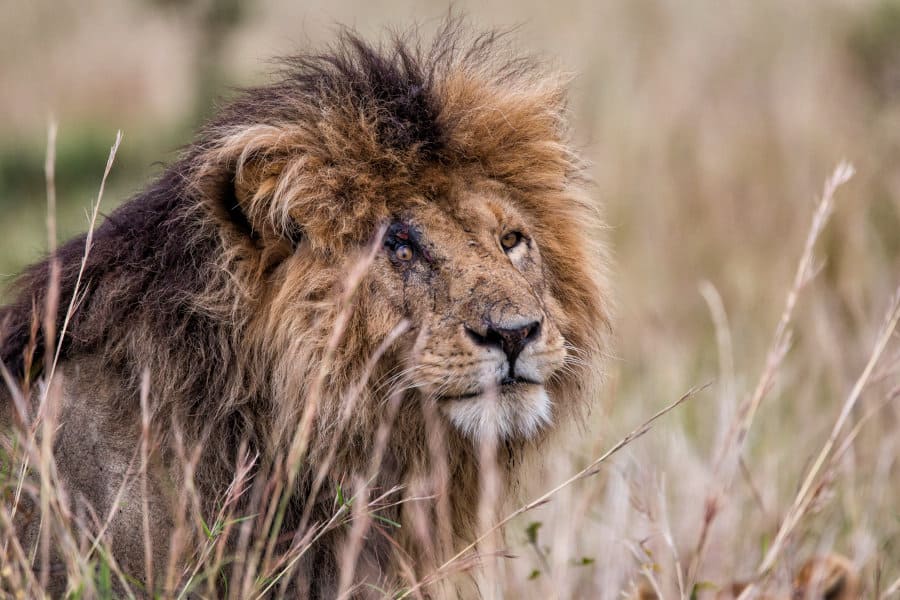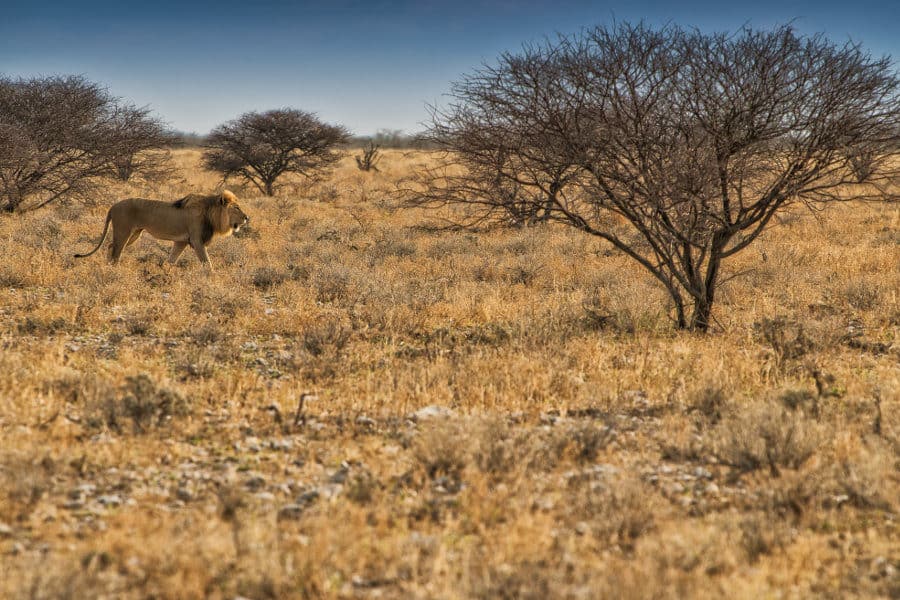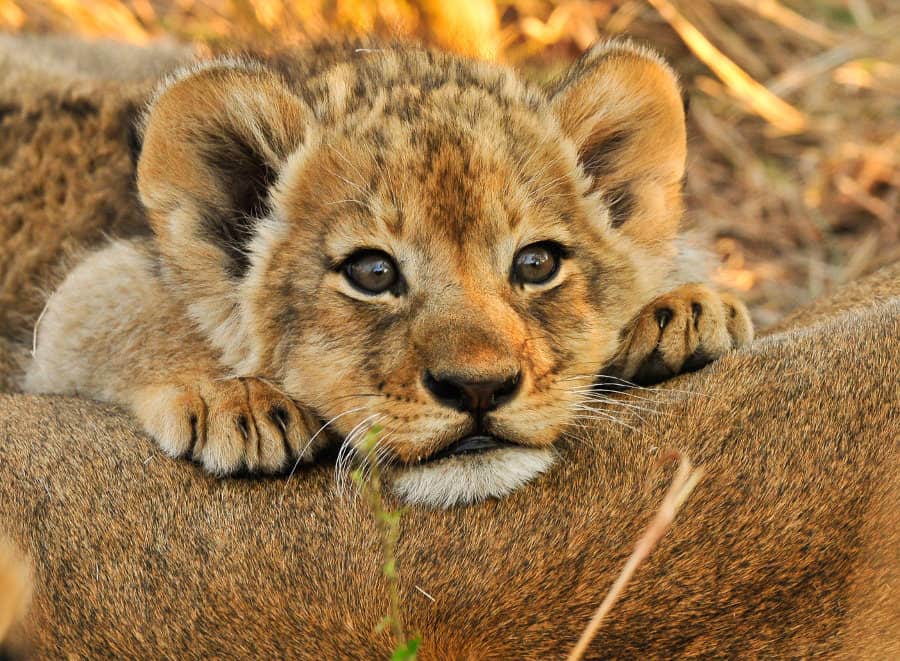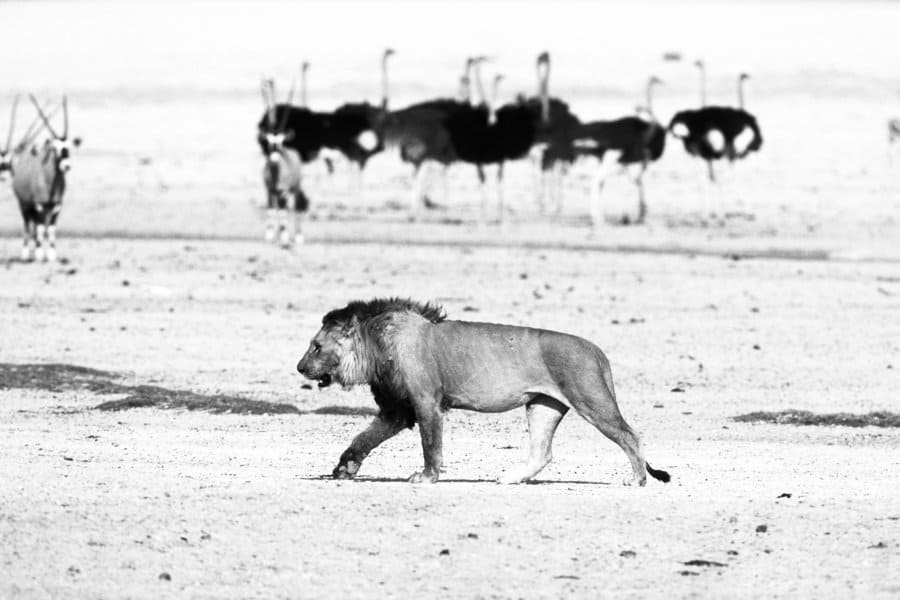How long do lions live?
On the surface, it’s a simple question. The simple answer is around 10-14 years, but that doesn’t tell the whole story, because a lion’s lifespan depends on many factors.
As an apex predator and symbol of strength, you might not expect lions to struggle for survival. Yet a lion’s life is difficult, dangerous, and – sadly – often cut short in its prime.
Wild lions have a much shorter lifespan than their captive counterparts, and few die peacefully in their sleep. That’s if they even make it to adulthood, which is something of an achievement.
In other words, the questions “how long do lions live?” and “how long can lions live?” have very different answers. But, if you dig a little deeper, you can find some context behind the numbers.
Join us as we explore all aspects of lion life expectancy, while learning all about this magnificent creature.
How Long Do Lions Live in the Wild?
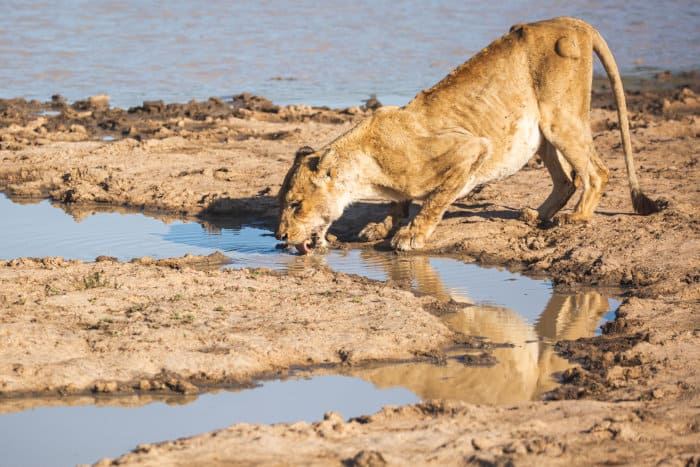
Lions that make it to adulthood have a life expectancy of around 10-14 years, though estimates usually range anywhere from 8-18 years. Some lions may live longer, while many don’t reach this age.
Although adult lions have no natural predators, many still die violent deaths, either at the hands of humans, each other, or from hunting injuries.
A violent life
Male lions are constantly striving to either gain or maintain territory – fighting off outsiders or trying to win the throne (ruling over a pride) themselves.
These fights can be fatal, or cause injuries and infection that the lion eventually succumbs to.
The strongest specimens could rule for several years, yet even the fiercest lions can’t fend off challengers forever.
Older males that survive a pride takeover are chased away and may eventually die of starvation, malnourished and unable to hunt prey.
Even the mightiest kings rarely get a happy ending.
A tough start: lion cub mortality
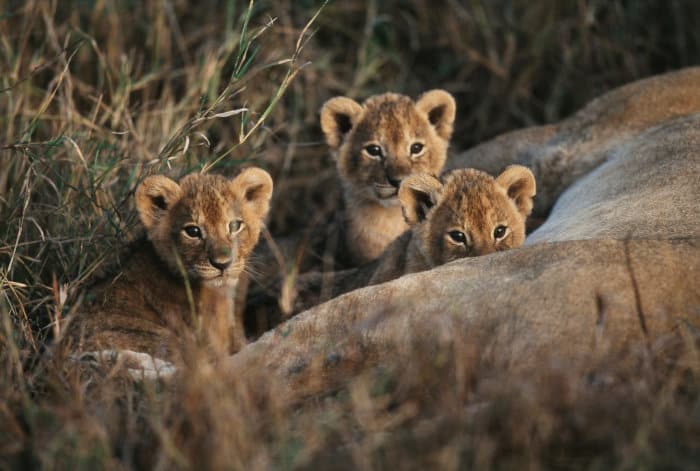
Lions are by far the most vulnerable as cubs.
Baby lions are born blind and helpless, and don’t even open their eyes until they’re a week old. At this stage they must rely on their camouflage to avoid detection by predators like leopards or hyenas.
Perhaps the biggest threat to lion cubs is other lions. If the pride male/s are defeated by outside rivals, these new males will likely kill any cubs they come across so they can sire their own offspring.
It sounds brutal, but killing the cubs ensures the lionesses will come back into estrus, so the new pride males grab the chance to pass on their genes.
With all these risk factors, only around 1 in 5 lion cubs will reach two years of age.
Leaving the pride
If a young lion beats the odds and makes it through these early years, there are still plenty of dangers ahead – especially for males.
Young lionesses often stay with the pride, but once males approach maturity at two or three years old, they’re forced out. Reigning pride males don’t want rivals threatening their supremacy – even their own blood.
Juvenile males are forced to fend for themselves, biding their time until they’re strong enough to challenge for leadership of their own pride. They’ll frequently team up with siblings or other relatives, forming coalitions.
These nomadic males are still vulnerable. Pride males will want to attack them, and without females to help with hunting, finding enough food is far from guaranteed.
Male vs Female Lion Life Expectancy
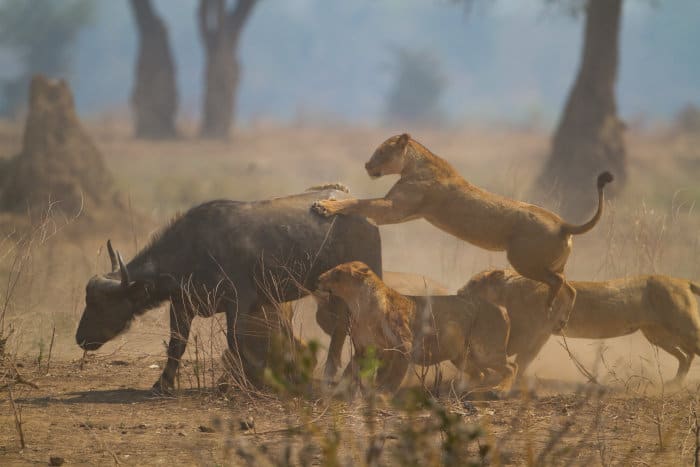
On average, female lion life expectancy is higher than males’. Male lions rarely live much longer than 10 years, but females commonly reach 15 or 16.
Why do lionesses live longer? There are several reasons.
For one, females usually integrate into their birth pride.
While young nomadic males roam the savanna either alone or in a small coalition, juvenile lionesses have the support and cooperation of the pride, which includes many of their close relatives. This is a big boost to their hunting success and survival chances.
Male lions can hunt, but they’re not as stealthy as the females. Nomadic males don’t have a pride to provide for them, so must rely on catching or scavenging their own food.
Meanwhile, they’re watching their back for pride males who won’t take kindly to their presence.
If a nomadic lion coalition does succeed in taking over a pride, there’s still the neverending job of maintaining territory and seeing off threats.
Male lion life expectancy is relatively low because there’s always a younger, hungrier rival waiting in the wings. And even the biggest, strongest lions can be outnumbered by a larger coalition.
Female lion lifespan: old age not guaranteed
That’s not to say female lions have it easy. They may live slightly longer, but they have their fair share of challenges.
Bearing the brunt of the hunting burden means more chances of serious injury. A kick from a zebra or a buffalo’s horn could bring an abrupt end to a female lion’s lifespan.
Lionesses aren’t immune to hostile pride takeovers, either. If the reigning male/s are overthrown by rivals, females may risk their lives protecting their offspring from the newcomers.
How Long Do Lions Live in Captivity?
Assuming a decent standard of care, lion life expectancy in captivity is higher than in the wild, with a lifespan of around 16-22 years.
Why do captive lions live longer? With most threats removed, the chances of a lion’s life ending suddenly and violently are much lower.
Yet there’s something to be said for “quality vs quantity”. Captive lions don’t have much to fear, but they also don’t have much to do in general. Lack of space and stimulation can contribute to a decline in mental health.
Wild lions may have the odds stacked against them, but at least they’re in their natural habitat, living as nature intended.
Asiatic Lion Lifespan
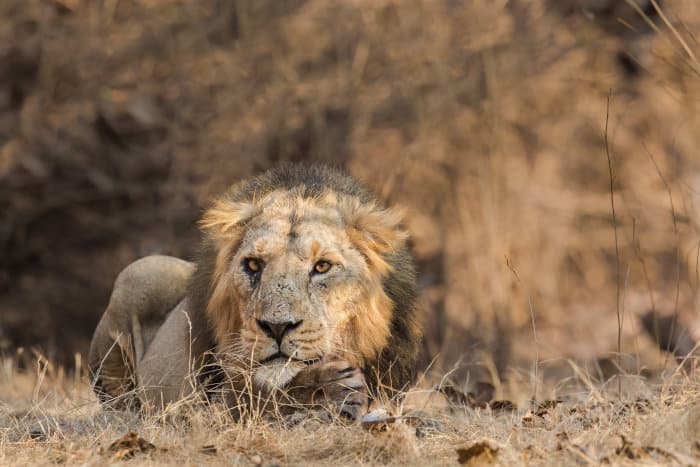
So far, we’ve been focusing on the African lion lifespan – but there’s also a small population of lions surviving outside of Africa.
The Asiatic lion once roamed much of southwest Asia, but today it only lives in and around the Gir forest in Gujarat, India.
Some sources suggest the Asiatic lion’s life expectancy is longer than its African counterpart, at 16-18 years.
This is a population of only several hundred individuals in a protected area, so it’s hard to directly compare to the African lion’s lifespan.
What is the Oldest Lion?
We’ve explored the average lifespan of a lion, but sometimes there are outliers who live much longer. So, who is the oldest lion ever?
The winner of this accolade is Arjun, a captive Asiatic lion at an animal rescue centre in India. Arjun lived to the age of 29.
As for the oldest wild lion, one possible contender is Loonkiito, a Kenyan lion who recently died aged 19.
Sadly, Loonkiito was speared by herders after preying on livestock – something that often happens when lions become too old and frail to feed on their usual prey.
Threats to Lion Life Expectancy
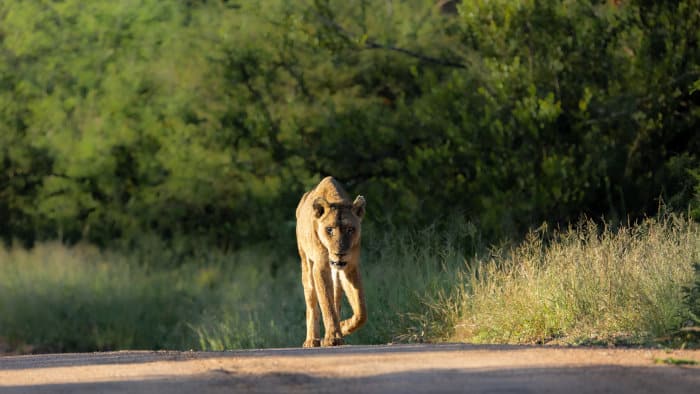
Sickness and disease affect lion life expectancy both in the wild and captivity.
Parasites like ticks and tapeworms afflict the big cats. Severe outbreaks of blood-sucking stable flies have also reduced lion populations.
Despite the name, Canine distemper virus can be deadly to lions as well.
Human impact
We can’t ignore the human impact on lion populations.
Once plentiful across Africa and Asia, lion numbers have dropped drastically. The African lion population has decreased 90% in the last century, and lions are now extinct in many countries where they once thrived.
Humans are responsible directly, through hunting and conflict with farmers, and indirectly, through habitat loss due to human population growth and agricultural expansion. Inbreeding and disease are further side-effects affecting today’s scattered lion populations.
Lions are classified as “vulnerable” on the IUCN Red List. With the current trajectory, it won’t be long before they’re endangered.
Average Lion Life Expectancy? It’s Complicated
As you can see, there’s no single answer to the question: “how long do lions live?”
Lion life expectancy varies based on many factors, from sex to food availability, stage of life, and more.
Most wild lions don’t even make it to adulthood. If we consider cub mortality, the average lion lifespan would be much lower than the figures given.
Lions in captivity can live for over 20 years – and some have reached almost 30 – yet that’s with significant help from humans. Wild lions don’t get injections, blood tests, or dental check-ups!
Captive lions also don’t have to worry about finding food or fighting off rivals, but boredom and mental health issues often take their toll.
Wild lions may have fewer years in their lives, but they certainly have more life in those years – hunting, fighting, and raising families of their own in their natural habitat.
Lions still thrive in certain protected areas of Africa, though humans need to do more to ensure the king of beasts survives on the continent.
Check out some of Africa’s top safari destinations, where you can see this majestic animal on its own terms.
